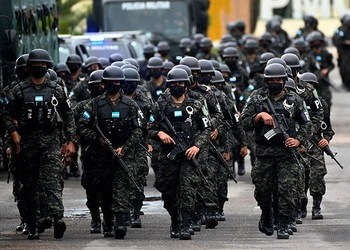El Salvador’s success in fighting gangs with a state of emergency inspired Honduras to do its own version. But one year on, two new reports suggest the country is seeing little results.
Although Honduras President Xiomara Castro enacted a nationwide state of emergency that suspended constitutional rights and multiplied security forces’ efforts to crack down on the Mara Salvatrucha (MS13) and Barrio 18 gangs, a December 5 report by the Armed Conflict Location and Event Data Project (ACLED) found that the country’s state of emergency had “yielded mixed results” and that violence against civilians has “continued unabated” in 2023.
SEE ALSO: El Salvador’s (Perpetual) State of Emergency: How Bukele’s Government Overpowered Gangs
What’s more, the crackdown may have had unintended consequences. Specifically, ACLED said violence had spread beyond the traditional hotspots of Tegucigalpa and San Pedro Sula, possibly due to “increased pressure on gangs in the most populous urban areas due to frequent law enforcement operations.”
Other crimes, such as extortion, have also spread, according to a forthcoming report on the state of exception by the Association for a More Just Society (Asociación para una Sociedad más Justa – ASJ).
“Extortion has gone up this year, rather than down,” Andreas Daugaard, the author of the report, told InSight Crime. While 9% of the population was affected by extortion during 2022, he said that number has risen to 11% this year.
This follows InSight Crime’s findings that six months after the beginning of the state of emergency, at least two new extortion gangs had appeared.
Extortion also appears to be spreading to new areas, according to ASJ’s research. While the highest rate of extortion remains in the country’s second-largest city, San Pedro Sula, the second-highest incidence is now in La Paz, the rural department that borders El Salvador.
“We see that extortion is a national crime,” said Daugaard.
In contrast, El Salvador, which is now nearly two years into a ruthless anti-gang crackdown, has suppressed gang activity almost entirely, a recent InSight Crime investigation found.
Homicides have fallen dramatically, and extortion, particularly in the transport sector, has plummeted. These gains, however, have come at a cost: the government has arrested over 1% of the population, suspended constitutional rights to due process, and is facing widespread allegations of torture and human rights violations inside the country’s prisons and beyond.
InSight Crime Analysis
The failings of Honduras’ year-long state of emergency are rooted in poor institutional development, geography, and politics.
No institution is as important as Honduras’ police force, which is chronically unstable and corrupt.
In 2011, the country began a series of police purges following a sharp increase in murders caused in large part by increased drug trafficking and gang activity. Several police officers, including San Pedro Sula’s top cop, have been accused of acting as hitmen for criminal groups, with members of the force also linked to the murder of the country’s anti-drug czar.
SEE ALSO: Honduras Anti-Gang Crackdown Targets Only One Source of Violence
These purges devastated the police force between 2016 and 2019, with almost 6,000 of the country’s 13,500 police officers removed, according to La Prensa.
Though the purges had some success in ridding the force of corruption, steps needed to rebuild a strong and resilient force were never taken, ultimately undermining the potential effectiveness of the state of exception, according to Eric Olson, director of policy and strategic initiatives for the Seattle International Foundation.
“It is not the case that an effective purge results in long-term professionalism,” he told InSight Crime. “It has to be accompanied by strong internal affairs functions, strong external accountability functions, greater transparency, better-trained police forces, adequate resources, and a whole host of other elements. A police purge is an important element, but only one.”
The lack of resources available to the police has also hindered efforts under the state of exception. A 2020 report from the Washington Office on Latin America (WOLA) found that between 2014 and 2017, the Honduran police’s human resources fell “well below the minimum required to provide at least basic territorial coverage.”
In 2019, Honduras had 173.3 police officers per 100,000, according to the Organization of American States (OAS). This is far below the 300 police per 100,000 suggested by the United Nations Office on Drugs and Crime (UNODC), and in stark contrast to El Salvador, which had 434.9 officers per 100,000.
Despite this, today the number of new Honduran police officers being trained is falling, according to Daugaard.
With an insufficient number of officers, the impact police could make against gangs in every reach of the country was limited. The country is mountainous, difficult to patrol, and large — one Honduran department, Olancho, covers a greater territory than all of El Salvador.
Lastly, Honduras’ political commitment to the strategy looks questionable. While the extortion problem was set as a primary reason behind the state of emergency’s implementation — Castro announced “a war on extortion” just days before it began — little progress has been made.
From January to November 20, 2023, there have been just 19 people sentenced for extortion nationwide, the ASJ report found, citing figures from Honduras’ Attorney General’s Office.
“While in El Salvador the state of emergency has been an effective strategy, for better or for worse, in Honduras it is less of an actual strategy and more of a publicity stunt that is supposed to make the police appear as effective as in El Salvador,” Daugaard told InSight Crime.
“But the results are not comparable,” he added.

